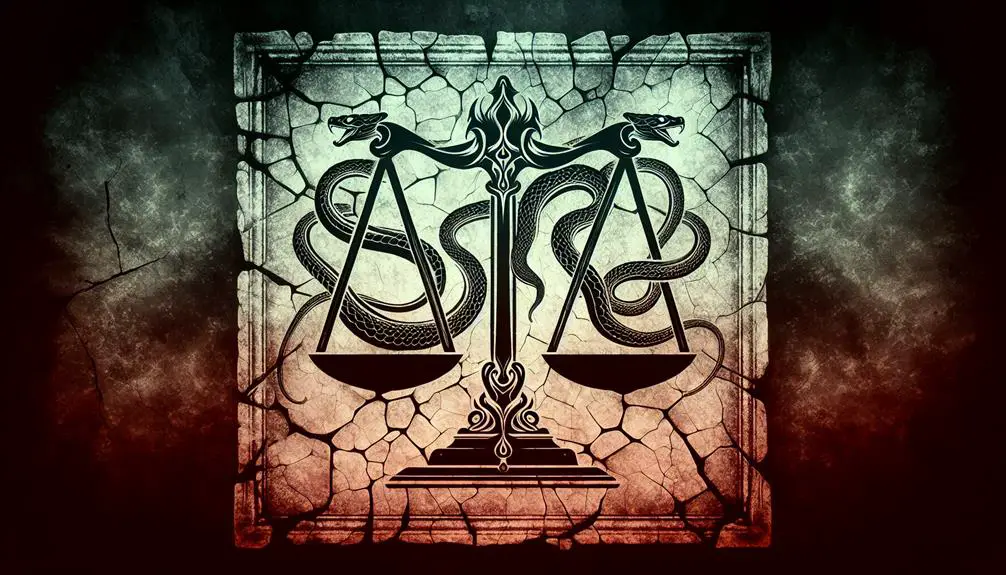Uncover the biblical definition of perversion, exploring its various contexts and the path to redemption it offers.

What Is Perverse in the Bible
Did you know that the term 'perversion' is mentioned over 50 times in various contexts throughout the Bible? You might find yourself intrigued by how ancient texts define and discuss what is considered perverse, from sexual immorality and idolatry to corruption and the twisting of divine laws.
As we explore these instances, you'll discover the profound impact these teachings have had on moral and ethical discussions throughout history. What's more compelling is understanding the path to redemption offered to those considered perverse.
Stick around, and you'll uncover the layers of meaning and interpretation that continue to challenge and enlighten.
Key Takeaways
- Perversion in the Bible involves actions that deviate from divine moral order, including sexual immorality and idolatry.
- Biblical narratives like Sodom and Gomorrah illustrate the severe consequences of sexual perversion.
- Idolatry, as a form of perversion, demonstrates the rejection of monotheism and spiritual fidelity.
- Redemption and transformation are possible for those who repent and commit to divine precepts, moving away from perverse actions.
Definition of Perversion

In the context of biblical literature, perversion refers to a deviation from what's considered morally right or natural, embodying actions or thoughts that stand in direct opposition to the established divine order. This deviation isn't merely a matter of differing opinions but signifies a profound moral decay, an erosion of the foundational values that are deemed sacred. Such decay is often depicted as the result of cultural influences that seduce individuals and communities away from their divinely ordained path.
You'll notice that throughout the biblical narrative, perversion isn't confined to a single act or thought but encompasses a wide range of behaviors and ideologies. These include, but aren't limited to, sexual immorality, dishonesty, greed, and injustice. These acts of perversion aren't merely personal failings; they represent a collective failure to adhere to the moral and natural laws set forth at the creation of the world. The Bible posits that when societies allow such perversions to flourish, they inevitably experience a form of moral decay that can lead to their downfall.
Furthermore, the influence of surrounding cultures on the chosen people of the Bible is a recurring theme. It's suggested that cultural influences often lead to the adoption of practices and beliefs that are antithetical to the prescribed divine order. This adoption isn't seen as a benign integration of new ideas but as a dangerous path that leads to moral degradation and spiritual peril.
Idolatry as Perversion

Idolatry stands as a glaring instance of perversion in biblical texts, directly challenging the monotheistic foundation on which these sacred writings rest. Through an analytical lens, you'll uncover that idolatry isn't merely the worship of graven images; it symbolizes a profound deviation from the spiritual fidelity expected by the God of the Bible. Modern interpretations often expand the concept of idolatry, identifying it with any obsession or devotion that takes precedence over one's duty to God, highlighting the timeless relevance of this perversion.
The cultural implications of idolatry in biblical times were significant, as they often represented not only theological but also social and political divergences. Idol worship was intertwined with the practices and gods of neighboring peoples, posing a constant threat to the identity and cohesion of the Israelites as a distinct community with unique divine guidance. This historical context underscores the perversion's gravity, as it wasn't just a personal failing but a communal betrayal.
Today, discussions around idolatry invite you to reflect on what modern idols—such as materialism, power, or even technology—might lead you away from a life of meaning and purpose as defined by your own beliefs or values. The biblical condemnation of idolatry serves as a cautionary tale, urging you to consider where your ultimate loyalties lie.
Thus, exploring idolatry as perversion in the Bible isn't just an academic exercise; it's a journey into understanding how spiritual infidelity, in any form, can distort one's values and life direction. The conversation about idolatry bridges ancient texts and contemporary dilemmas, revealing the pervasive challenge of staying true to one's convictions in a world full of distractions.
Sexual Immorality Explored

You'll find that the Bible provides explicit definitions of sexual immorality, setting the stage for an in-depth examination.
Through notable scriptural examples, you'll grasp the varied manifestations and understand the stark consequences faced by those who strayed.
Furthermore, the concept of redemption offers a pathway to understanding the transformative power of repentance and forgiveness in these contexts.
Biblical Definitions Clarified
Sexual immorality, as defined in the Bible, encompasses a range of behaviors that deviate from the sexual ethics prescribed in the sacred texts. Understanding these definitions requires grappling with cultural misunderstandings and considering the historical context. The Bible's teachings on sexual conduct cannot be fully appreciated without acknowledging the societal norms and values of the times in which it was written. This historical perspective sheds light on the nuanced meanings behind these teachings, which might be misinterpreted when viewed through a modern lens.
Term |
Biblical Context |
Modern Interpretation |
|---|---|---|
Fornication |
Sexual intercourse outside marriage |
Broadly used for premarital sex |
Adultery |
Infidelity within marriage |
Also seen as betrayal or dishonesty |
Lust |
Intense or uncontrolled desire |
Often equated with sexual desire |
Purity |
State of moral cleanliness |
Sometimes viewed as virginity |
Homosexuality |
Specific sexual acts |
Identity or orientation |
Notable Scriptural Examples
Having established the various definitions of sexual immorality within both ancient and contemporary contexts, we now turn our attention to specific instances in scripture where these behaviors are exemplified and explored. These narratives not only depict the acts themselves but also highlight the broader themes of moral decay and prophetic misinterpretation that accompany such transgressions.
The tales of Sodom and Gomorrah, David and Bathsheba, and the explicit condemnations found in Leviticus serve as poignant examples. Each story unfolds within a complex tapestry of cultural, religious, and ethical considerations, challenging readers to understand the multifaceted nature of sin.
These scriptural examples underscore the consequences of ignoring divine mandates, offering a lens through which to view the repercussions of sexual immorality on a societal level.
Consequences and Redemption
In exploring the consequences and paths to redemption for sexual immorality, scripture presents a nuanced understanding of both the individual and collective fallout from such actions. You'll find that the repercussions aren't just temporal; they extend into the spiritual realm, affecting one's relationship with the divine.
However, the narrative doesn't end with condemnation. Scripture also lays out a road to moral restoration and spiritual renewal. This journey involves sincere repentance, a turning away from sinful behaviors, and a commitment to live according to divine precepts. It's a process that not only aims to restore one's standing before God but also to heal the emotional and psychological wounds inflicted by immorality.
Through this, scripture illustrates a profound belief in the possibility of redemption and transformation, even in the face of grievous sin.
Corruption and Injustice

You'll find that the Bible addresses corruption and injustice as pervasive issues, marking them as contrary to divine law.
By examining how scripture defines corruption and portrays injustice, you can better understand the moral framework it establishes.
Furthermore, exploring the consequences of perversion sheds light on the ethical imperatives inherent in these texts.
Defining Biblical Corruption
The concept of biblical corruption encompasses both moral decay and the perversion of justice, as repeatedly condemned throughout the scriptures. You'll find that moral decay and ethical distortions are central to understanding this corruption. They manifest in various forms:
- Moral Decay: This refers to the gradual deterioration of ethical standards, leading individuals away from the virtues upheld in the Bible.
- Ethical Distortions: These are misinterpretations or manipulations of ethical teachings, resulting in behavior that strays from biblical principles.
- Perversion of Justice: Although this will be explored further, it's crucial to recognize its role in the broader context of corruption.
Analyzing these elements provides a comprehensive picture of biblical corruption, focusing on the moral and ethical implications rather than solely on judicial misconduct.
Injustice in Scripture
Having explored the broad contours of corruption, we now turn our attention to how scripture addresses the complex issue of injustice, underscoring its multifaceted impact on both individual and societal levels. Scripture is replete with narratives and laws that highlight the importance of confronting injustice, weaving through its text a tapestry of equity teachings and moral dilemmas. These elements serve not only as historical accounts but also as ethical guideposts for contemporary reflection and action.
Aspect |
Significance |
|---|---|
Equity Teachings |
Anchor for moral and societal justice |
Moral Dilemmas |
Challenge individuals to reflect and act justly |
Individual Impact |
Calls for personal integrity and fairness |
Societal Impact |
Urges communities towards collective righteousness |
Scriptural Accounts |
Provide frameworks for understanding and addressing injustice |
Consequences of Perversion
In scripture, numerous accounts vividly depict the dire consequences that stem from acts of perversion, encompassing both corruption and injustice, on both individuals and communities. These narratives serve not only as warnings but also as lessons on the ripple effects of moral decay. The societal impacts are profound and multifaceted:
- Erosion of Ethical Values: Perversion leads to a gradual decline in moral standards, making unethical behavior more acceptable.
- Breakdown of Social Cohesion: As trust erodes, the fabric of community life is weakened, leading to increased isolation and conflict.
- Injustice and Inequality: Perversion fosters an environment where injustice thrives, disproportionately affecting the most vulnerable in society.
Analyzing these consequences, it becomes clear that the biblical warnings against perversion are deeply rooted in concerns over societal well-being and moral integrity.
The Role of False Prophets

False prophets play a critical role within biblical narratives, manipulating the faithful with misleading teachings that diverge from divine truths. Their presence in scripture serves as a cautionary tale, warning believers against being led astray by those who falsely claim divine inspiration. This theme underscores the importance of discerning prophetic authenticity, a challenge that resonates with both ancient audiences and modern interpretations of the Bible.
The Bible provides criteria for identifying false prophets, such as their tendency to contradict established divine laws or their failure to see their predictions come to pass. This framework not only helped ancient communities safeguard their spiritual integrity but also offers contemporary believers a lens through which to assess the validity of those who claim prophetic gifts today. In this way, the biblical portrayal of false prophets isn't just a historical or religious curiosity; it's a timeless guide for navigating the complex landscape of spiritual leadership.
Moreover, the narratives surrounding these figures often highlight the destructive consequences of their influence, from leading people into idolatry to fostering social discord. This emphasis on the dangers of false teachings emphasizes the Bible's concern with maintaining a pure and unadulterated faith. Consequently, the study of false prophets in the biblical context isn't merely an academic exercise but a vital practice for believers seeking to uphold the integrity of their faith amidst a plethora of voices claiming divine authority. Through this lens, the biblical warnings against false prophets remain as relevant now as they ever were, guiding individuals in their pursuit of genuine spiritual insight.
Perverting Divine Laws

Perverting divine laws represents a fundamental betrayal of the sacred trust between humanity and the divine, directly challenging the moral and spiritual order established by scripture. This act goes beyond mere disobedience, delving into the realm of actively reshaping or outright rejecting divine commandments. Such actions have profound implications, not just for the individual, but for society as a whole, leading to moral decay and a plethora of ethical dilemmas.
When you consider the impact of perverting divine laws, it's crucial to understand the multifaceted consequences:
- Moral Decay: The deliberate misinterpretation or manipulation of divine laws erodes the moral foundation of society. As individuals and communities deviate from these laws, the resultant moral decay manifests in various forms of unethical behavior, compromising societal integrity and cohesion.
- Ethical Dilemmas: Perverting divine laws introduces complex ethical dilemmas, forcing individuals and communities to navigate a murky landscape where the line between right and wrong blurs. These dilemmas challenge the very essence of ethical living, making it difficult for people to discern and adhere to virtuous paths.
- Spiritual Alienation: At the heart of perverting divine laws is a profound spiritual alienation from the divine. This estrangement not only affects the individual's relationship with the divine but also diminishes the collective spiritual vitality of the community, weakening its connection to sacred traditions and values.
Understanding the gravity of perverting divine laws helps illuminate the path towards reclaiming a moral and ethical compass, essential for fostering a just, cohesive, and spiritually vibrant society.
Examples From Biblical Stories

Throughout biblical narratives, numerous stories vividly illustrate the consequences of perverting divine laws, offering both cautionary tales and insights into the fragility of moral integrity. One striking example is Cain's jealousy toward his brother Abel. This story underscores how envy can corrupt one's heart, leading to the ultimate perversion of justice: fratricide. Cain's inability to control his jealousy, despite God's warning, showcases a deliberate choice to deviate from divine guidance, highlighting a profound moral failure.
Similarly, the Tower of Babel narrative serves as a potent example of human hubris challenging divine authority. The people's ambition to build a tower reaching the heavens demonstrates a collective effort to usurp God's place, reflecting a perverse desire for fame and autonomy that directly contravenes the intended order of creation. God's response, to confuse their languages, not only halts their project but also disperses them across the earth, emphasizing the futility and consequences of attempting to subvert divine will.
These stories, among others, serve as critical reflections on the nature of perversity in the biblical context. Cain's act of murder and the construction of the Tower of Babel aren't merely historical or mythical anecdotes; they're archetypal narratives that warn against the perils of allowing pride, jealousy, and ambition to drive one away from adhering to divinely ordained moral and ethical standards. In analyzing these examples, it becomes evident that the Bible consistently portrays the perversion of divine laws not just as acts of disobedience, but as fundamental moral failings that have far-reaching consequences for individuals and communities alike.
Path to Redemption

Reflecting on these narratives, it's clear that the Bible also offers a path to redemption for those who've strayed from divine laws. This journey isn't merely about returning to a state of compliance but involves a profound moral transformation and spiritual renewal. The process is intricate and demands sincere commitment, yet it's achievable and outlined with clarity in the scriptures.
The path to redemption can be encapsulated in three essential steps:
- Acknowledgment of Wrongdoing: The first step is a candid admission of one's sins. This acknowledgment isn't just an outward confession but an inward realization of how one's actions have deviated from God's commandments. It's a critical foundation for genuine repentance and moral transformation.
- Repentance: Following acknowledgment is the act of repentance. This isn't merely feeling remorse but entails a decisive turn from sin towards righteousness. It's a commitment to abandon the perverse and embrace a life in alignment with divine principles. Repentance is pivotal for spiritual renewal, symbolizing a break from the past.
- Reconciliation with God: The final step is seeking and receiving God's forgiveness. This reconciliation is made possible through faith and, in Christian belief, through the redemptive sacrifice of Jesus Christ. It marks the restoration of the individual's relationship with God and is the culmination of the journey towards redemption.
These steps highlight that the path to redemption is accessible to all, regardless of past transgressions. It's a testament to the Bible's message of hope, emphasizing that moral transformation and spiritual renewal are within reach for those who earnestly seek it.
Frequently Asked Questions
How Have Modern Interpretations of Biblical Perversion Impacted Contemporary Legal Systems and Social Norms?
Modern interpretations of biblical perversion have significantly influenced contemporary legal systems and societal shifts. You'll find that legal reforms often reflect changing perceptions of morality, directly shaped by evolving interpretations of religious texts. These shifts in understanding contribute to societal norms, guiding what's considered acceptable or deviant behavior.
As you delve deeper, it's clear that these interpretations have a profound impact on both legislation and social attitudes, shaping the fabric of society.
In What Ways Do Different Denominations Within Christianity Disagree on What Constitutes Perversion According to the Bible?
Different Christian denominations disagree on what's considered perversion, particularly regarding marital roles and dietary laws. Some see strict adherence to traditional gender roles within marriage as biblically mandated, while others interpret these texts more liberally.
Dietary laws also divide opinions, with certain groups viewing the consumption of particular foods as perverse, contrary to those who believe these restrictions were contextually bound and not applicable today. These discrepancies highlight the diverse interpretations within Christianity.
How Do Cultural Contexts Outside of the Judeo-Christian Tradition Influence the Understanding and Application of Biblical Perversion in a Globalized Society?
Cultural relativism plays a crucial role in how you interpret biblical perversion globally. As societies vary, so do their understandings and applications of religious texts.
Global interpretations of the Bible aren't uniform, as cultural contexts outside the Judeo-Christian tradition significantly influence perceptions. This diversity means you're likely to encounter differing views on what's considered perverse, highlighting the complexity of applying ancient scriptures in a modern, globalized society.
What Are the Psychological Impacts on Individuals Who Have Been Labeled or Feel as Though They Engage in Behaviors Considered Perverse by Biblical Standards?
Being labeled with behaviors deemed perverse can deeply affect you. Studies show that individuals in this situation often experience a significant drop in self-esteem.
It's crucial to explore recovery strategies that address these psychological impacts. Engaging in supportive therapies and community involvement can foster resilience and self-acceptance.
Analyzing how these labels affect mental health is essential for developing effective interventions that help rebuild your sense of self-worth and identity.
How Has the Concept of Perversion in the Bible Been Used or Misused in Political Discourse and Policy-Making in Various Countries?
In political discourse and policy-making across countries, the concept of perversion has often seen historical misuse. You've likely noticed how it's wielded to justify or condemn actions, particularly with gender implications at the forefront.
This manipulation not only reflects societal norms but also influences them, shaping laws and attitudes towards gender and sexuality. Analyzing these patterns reveals a complex interplay between religious interpretations and political objectives.
Conclusion
In the vast expanse of biblical teachings, you'll find a stark contrast between the divine path and the allure of perversion. Idolatry, sexual immorality, corruption, and the deceit of false prophets are illuminated against the backdrop of divine laws, offering both a warning and a mirror to your soul.
Through the stories of those who veered off and those who sought redemption, you're reminded of the delicate balance between condemnation and grace, urging you toward a righteous path.



Sign up